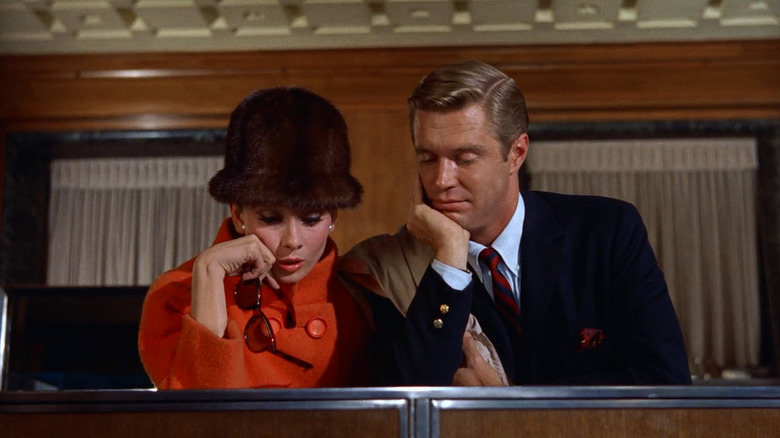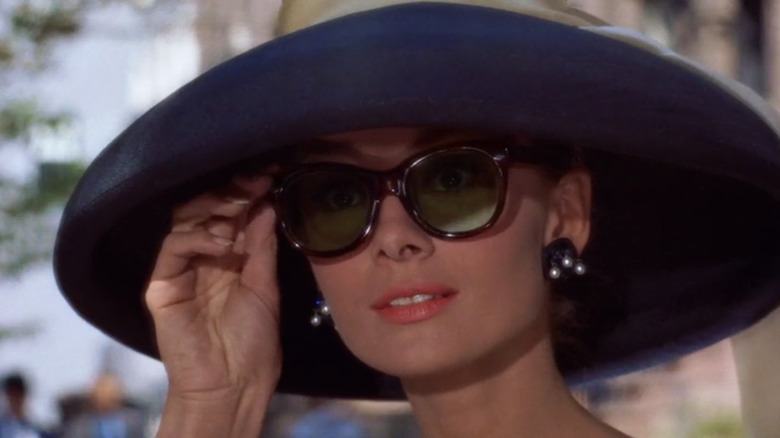Audrey Hepburn's Breakfast At Tiffany's Role Was Originally Written For Marilyn Monroe
"Breakfast at Tiffany's" may be Audrey Hepburn's most iconic film, but her character was ironically based on another Hollywood starlet, Marilyn Monroe. The film was adapted from a 1958 novella of the same name by famed author Truman Capote. The writer was a close friend of Monroe's, The Guardian reports, and his first choice for the part.
The main character of Capote's story, Holly, bears an uncanny resemblance to Monroe. A small town girl trying to break into show biz, she changes her name from Lulamae to Holly, just as Monroe changed her name from Norma Jeane. Both Monroe and Holly spent time in orphanages during their depression-era childhoods. Monroe was sexually abused at a young age, according to the New York Post. Holly also alludes to being molested as a child, dismissing "anything that happened before I was 13, because, after all, that just doesn't count." The author even describes Holly as a woman with an upturned nose, short hair with a "somewhat self-induced" tousle and "strands of albino-blonde and yellow," along with "large eyes, a little blue, a little green" — almost an exact physical description of Monroe.
Holly's transformation, complete with a new name, closely resembles Monroe's own story. And just like Monroe, Holly runs away from the limelight just when it is truly landing on her. Both Capote's character and the real-life actress moved to New York at the height of their careers. The author also eerily predicted Monroe's death, describing Holly as "strictly a girl you'll read where she ends up at the bottom of a bottle of Seconals." The actress died of a barbituate overdose just four years after the book was published.
So how did a part made so explicitly for Monroe go to another actress?
Monroe was afraid the part was too risque
Interestingly, it was Monroe herself who turned down the part of Holly Golightly. The actress was Capote's first choice for the role, but she ultimately rejected the film under the advisement of her acting coach Paula Strasberg, according to Hepburn's biographer Sam Wasson. "The reason Marilyn didn't take the part is because Paula Strasberg, her advisor and acting coach, said Marilyn should not be playing a lady of the evening," Wasson told ABC. "That's interesting in light of how we think of Holly, we don't think of her as that risque."
Monroe's image has always been hypersexual, while Hepburn's was more elegant and refined. This casting choice would have set a completely different tone for the character. Monroe's pivot to formal theatrical training in the mid-'50s suggested her resistance to being type-cast as a dumb blonde. She may have thought that Holly would play into her being typecast, but Hepburn's performance makes Holly appear anything but stupid.
The role ultimately went to Hepburn, and it's hard to imagine it any other way. Hepburn was closely associated with Cinderella-style makeover stories, having starred in the hit romantic comedy "Sabrina" a few years prior. However logical it may seem in retrospect, Capote was not at all happy with this casting choice. "Paramount double-crossed me in every way and cast Audrey," the author once said (via Vogue).
"Breakfast at Tiffany's" may have been written for Monroe, but Hepburn plays the part perfectly. The 1961 romantic comedy is one of old Hollywood's crowning achievements. Monroe was an icon even without this film, but there's no telling what kind of reputation "Breakfast at Tiffany's" would have if the turbulent starlet had accepted the role. Would Monroe have improved the role, or was the character almost too true to life for her to imitate onscreen?

